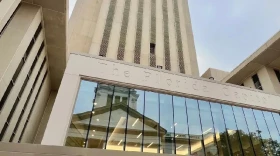The Florida Legislature has approved a bill that will allow the expansion of needle exchanges throughout Florida.
The Infectious Disease Elimination Programs bill—which passed a house vote on Wednesday and has already passed in the Florida Senate—creates a legal mechanism for counties to authorize programs that swap clean syringes for dirty ones. Needle exchanges have been shown to reduce the spread of blood borne infections—like HIV and hepatitis C—among intravenous drug users.
The bill was modeled on the IDEA Exchange in Miami-Dade County, which was given a five-year trial approval by the legislature in 2016. In the three years it's been around, the IDEA Exchange has reported to the health department that it's pulled more than a quarter million used needles out of circulation. It hands out Narcan (the drug that reverses opioid overdoses)—and, according to the exchange, making this drug available has prevented more than a thousand overdoses. The program also offers testing for HIV and hepatitis C, and it connects people to medical care and drug rehab.
"It was very, very emotional," said Dr. Hansel Tookes, who has been advocating for needle exchange access in Florida since he was a medical student at the University of Miami. He's now head of Miami's IDEA Exchange. Tookes travelled to Tallahassee for the vote, which happened late Wednesday night.
"We'd been waiting for 10 hours. And finally the bill came up and there was nothing but love and compassion," he said.
Historically, the distribution of needles without prescriptions violated drug paraphernalia possession laws as interpreted in Florida—the Infectious Disease Elimination Programs bill creates clear guidelines for doing so legally as a public health intervention.
The final language of the bill will need to be reconciled between the House and Senate before heading to the governor's desk. The House version of the bill bars state and municipal funds from being spent on needle exchanges. The Senate version bans only the use of state funds.
You can read more about the IDEA Exchange, the program that created the road map for the statewide needle exchange bill and listen to a story about it here:
Copyright 2020 WLRN 91.3 FM. To see more, visit WLRN 91.3 FM. 9(MDAyMTYyMTU5MDEyOTc4NzE4ODNmYWEwYQ004))





